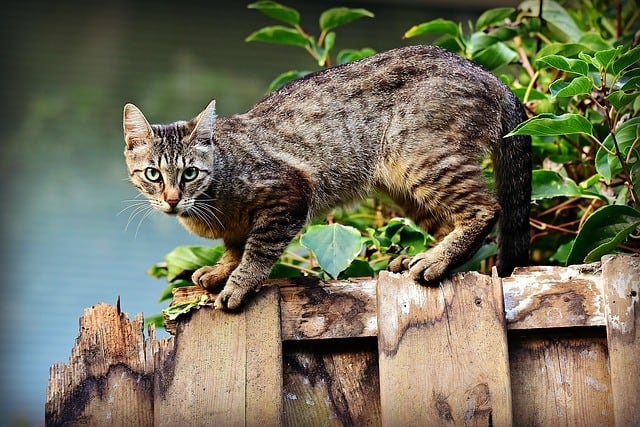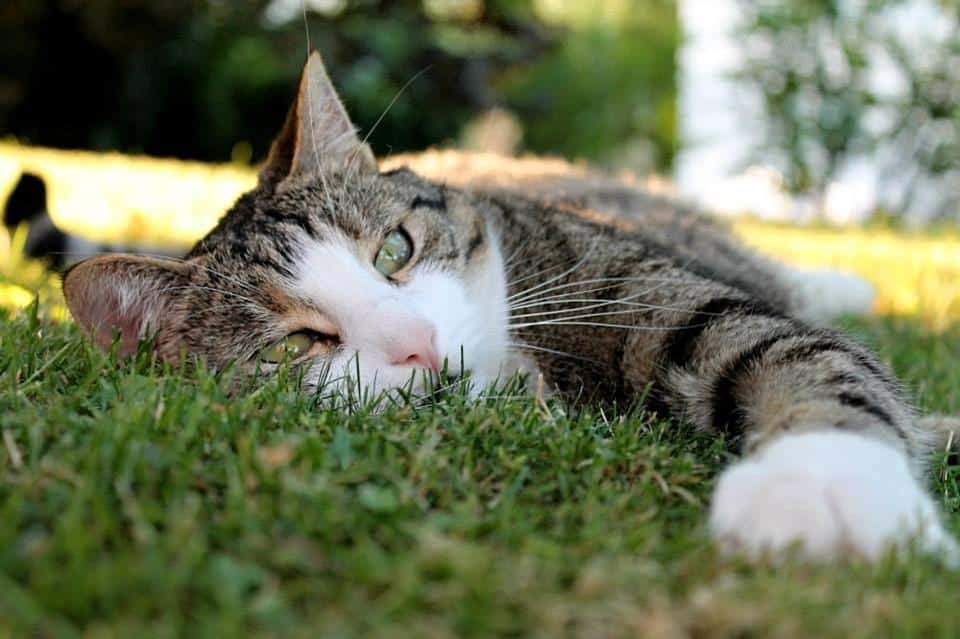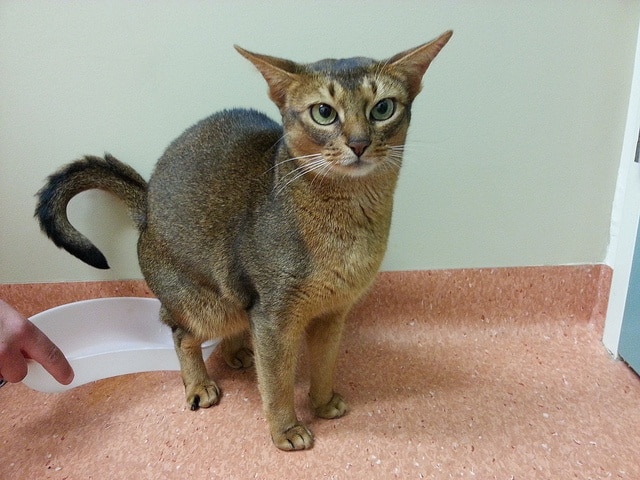A male cat is more likely to spray than a female cat. However, do male cats spray after being neutered? Most veterinarians would recommend having a male kitten neutered before he reaches sexual maturity.
Preventing overpopulation is probably the main reason for this feline surgical operation.
However, neutering is also an effective way to stop your kitty from spraying.
Other pet owners have their own unpleasant experiences to tell when it comes to their pet’s spraying habit.
It is important to point out that there's a vast difference between urinating and spraying.
Regular urinating occurs when the kitty squats to pee on the floor, furniture, or other things on a horizontal surface.
Spraying, on the other hand, is done when a kitty backs up to a vertical surface and squirts urine with his tail erect. While spraying, the tail usually quivers.
Urinating can be easily managed by training your feline pet on how to use a litter box. However, the same can't be said to spraying.
Moreover, to make it worse, urine spray has a much stronger odor that litter-box urine. However, why is it so?
Cats spray not only to excrete urine but also to convey a message, as a means of communication or a territorial marking.
To make the message clear, they release strong pheromones into their urine before they spray.
Having foul-smelling furniture or walls is not something we'd wish for in our household.
If you ever intend to adopt a kitty, the first thing that you’d probably consider is how to prevent them from spraying.
The good news is, there are solutions to this unwanted behavior.
However, the most recommended and most useful of these solutions is neutering.
Statistically, 90% of neutered cases have shown that the subjects have eliminated this rude behavior.
This means that there is a slim 10% chance that your furry pet would still spray after being neutered.
Keep in mind that the surgical procedure itself is infallible. Moreover, you shouldn't blame your vet if the process didn't meet its purpose.
If your feline pet continues to spray even after being neutered, you may want to look at other medical issues.
It is highly probable that your pet is having some underlying health problems that may cause continuous spraying.
Before we discuss how neutering can help minimize or stop spraying, let us first try to discover the root problem. What is spraying and why do male cats exhibit this obnoxious behavior?
Why Do Cats Spray?

No matter how hard you train them, cats still would tend to pee outside their litter box at some point.
While inappropriate urination can be a bit annoying, it’s essential to understand the reasons why they do it.
One thing is for certain; they don't spray to annoy us. For sure, there are some valid reasons why they spray.
1. As a means of communication
Odd but true, felines may use their urine to send a message to other felines nearby. You might have noticed that the urine odor changes from time to time.
There are times when their spray smells quite a bit stronger than usual. This is because the odor depends on the severity of the message they’re trying to convey.
Strong-smelling urine means that your pet wants to make a definite statement towards other felines.
2. Marking territory

Felines are territorial creatures. By leaving their marks on a particular area, they let other felines know that the area belongs to them.
This mark can be in the form of pungent smelling urine. Felines can release strong chemicals (mixed into the urine) to create their unique miasma.
So, by spraying the area with their signature odor, they’re telling other felines to keep away from their territory.
That is incidents of spraying are more likely in multi-pet households. With other pets living under the same roof, they tend to distinguish their domain through spray.
3. Mating behavior
As they reach sexual maturity, male cats typically find ways to inform female kitties that they’re available to mate with.
A mature male feline produces testosterone, a sex hormone responsible for sexual development and mating behaviors.
When a male kitty suddenly sprays more than usual, it may be an indication that he wants to mate.
Since testosterone is primarily produced in the testicles, surgical removal of this sex organ also eliminates their urge to mate.
Hence, this procedure can significantly minimize, if not eliminate, this behavior in male cats.
4. Medical issues

One of the most probable causes of constant spraying is an underlying health problem. If you see your pet in pain when he sprays, consider this as a dangerous sign.
Cats are not supposed to be in distressed when they pee. However, in the case of urinary tract infection and diabetes, urinating may cause them severe discomfort.
Always be vigilant and carefully observe your pet’s behavior when urinating. If you notice something out of the ordinary, a trip to the vet will help you enlighten about your pet’s health condition.
5. Litter box issues
Aside from medical problems, your furry friend might also have some litter box issues that may explain his inappropriate urination.
Felines are fastidious by nature. If they find something wrong with their litter box, they would undoubtedly refuse to use it.
Moreover, this would tempt them to pee on other places such as furniture, couch, walls, and other household belongings.
Fixing litter box issues is quite simple and is not as complicated as dealing with medical problems. All you have to do is make a change in the litter according to their liking.
As picky creatures, they have their preference when it comes to a litter box. Consider what your pet wants explicitly before buying a litter box.
It may take time to convince your feline pet, but if he's comfortable with it, he'll eventually use the litter box.
However, if your kitty still refuses to use it, try placing the litter box in a different location. It is also possible that your pet doesn't approve of the litter's position.
Due to their hygienic nature, they prefer to do their things in a private setting.
Try moving the litter box in a less traffic area to give them the privacy they want.
Then again, make sure that the private area is not too dark as they tend not to do well in the dark.
Furthermore, cats prefer to do their private things in a quiet place where there are no noises that can interrupt them.
More importantly, make it a habit to change the litter regularly. As we said earlier, felines are innately hygienic, and they want their litter box clean at all times.
Naturally, they would find someplace else to pee if they see their litter box is messy or unclean.
If everything still fails to convince your pet, you may now consider buying a different brand of a litter box. It may be entirely because your kitty is not comfortable with the litter box itself.
Find a litter box that perfectly suits your kitty’s needs and preferences. Once you’ve found the right product, stick with it and don’t try to experiment with other brands.
As creatures of habit, felines are instinctively into forming a routine and consider that habit as their way of life.
Once they got familiar with it, making a change to their litter box can take a toll on their behavior.
6. Anxiety or depression

Stress and anxiety may have something to do with their obnoxious behavior. Feline behavior is not that different from human behavior after all.
Cats, just like humans, are also susceptible to anxiety, depression, and other mental health issues. However, felines have their unique ways of expressing their concern, one of which is through spraying urine.
With that being said, you can fix this problem by eliminating stress from your pet’s life. While it is easier said than done, there are several ways to ease your pet’s anxiety or depression.
First is to find out what makes your pet anxious. Make his environment stress-free and comfortable as possible to prevent anxiety.
The best way to combat your pet’s depression is to spend with them and play with them. Loneliness can lead to depression so make sure that they don’t feel lonely or neglected.
How to Stop a Cat from Spraying

Living with an adorable and affectionate cat is bliss, but good things come with a price. If you ever intend to live with a male cat, you'll have to get used with his unusual behaviors.
Of course, one of these behaviors is spraying, which can be displeasing. However, hope is not yet lost entirely.
As we stated earlier, there are ways to minimize or stop your kitty from spraying. The first solution is letting your kitty undergo a surgical operation that involves the removal of the testicles.
Since testosterone is produced in the testicles, removal of these organs can significantly minimize or eliminate aggressive behaviors.
Aside from preventing your male kitty from reproducing, this procedure also depletes your pet's sexual urges.
Thus, eradicating some of his annoying mating behaviors such as spraying.
This surgical operation is called neutering and is a standard procedure performed on most domestic cats.
Neutering in male cats is also known as ‘castration' while neutering in female kitties is called ‘spaying.
When a female kitty is spayed, the female’s reproductive organs (ovaries and uterus) are surgically removed.
Regardless of your feline pet's gender, it is highly advisable to have them neutered.
That is if you want to get rid of their irksome urination habit.
However, do male cats spray after being neutered? Moreover, should this happen, what are the alternative solutions to undertake?
Based on studies, out of all the test subjects that have undergone neutering, 90% of them have stopped spraying. The result is highly favorable because you only have a slim 10% chance of failure.
Looking at the favorable success rate, it is safe to assume that neutering your feline pet is worth the gamble.
Spraying After Neutering

Although the possibility is slim, there is still a chance that your kitty will continue spraying even after being neutered.
The effect of neutering in the prevention of inappropriate urination may vary from case to case.
Take note that three possible outcomes come after the procedure. First, this behavior may disappear immediately after neutering.
With the removal of the testicles, the cat can no longer produce testosterone which is responsible for their sexually-driven behaviors.
After neutering, spraying should be instantaneously eliminated or reduced.
Second, if spraying does not disappear instantly after the procedure, it should disappear gradually.
Remember that felines are creatures of habit and it would take some time before they can banish a routine.
Even without the urge to spray, their habit of doing this behavior would compel them to continue doing so.
However, don't worry, this behavior will eventually cease in time. It may take up to 3 to 6 months to see the changes.
The third possible outcome is that spraying may not disappear after the procedure.
If your kitty continues to spray for more than a year after the process, you may need to resort to other alternative solutions.
It's highly probable that your pet's spraying behavior is not hormonal-driven, but some other factors may trigger it.
This usually happens in older male cats that have deeply formed this habit for most of their lives.
In this case, even neutering won’t be enough to make them omit this routine that they’re accustomed to.
Another factor that may be causing this behavior is stress which can be rooted from anxiety and depression.
If this is the case, neutering may not be the best solution to fix their mental health problems.
To deal with this, the first thing to do is to look for the things that are triggering your pet’s stress. Some of the most common stress triggers in cats are:
You can ease your pet’s stress away by eliminating these factors and spending more time with them.
Of course, medical issues should not be overlooked too. Your furry pet may be suffering from specific health problems that might trigger them to spray.
Try to look at the possibility that your pet is adopting a different posture to urinate due to bodily pain or discomfort.
Lower urinary tract disease, for example, is common among felines and is associated with inappropriate urination, bloody discharge, and pain.
Aside from urinary tract diseases, other medical conditions such as hyperthyroidism, feline leukemia virus, and liver disease can also be the root.
If your kitty continues to spray after the procedure, consult with your vet for a proper diagnosis and further medication.
When is the Right Time to Neuter a Kitten?

Typically, male cats reach sexual maturity at the age of 5 months. Having a 5-month old kitten to undergo surgical operation may seem a bit untimely.
That is why most pet owners would wait until their pets turn about eight months old to be neutered.
Not all cats mature at the same time, and some may reach maturity earlier or later than five months.
Considering this fact, neutering a male kitten around eight months of age is just reasonable. However, can we wait until they're old enough to be neutered?
Keep in mind that it may be impossible to stop a cat from spraying if it already becomes a habit. If you don't neuter your pet early, it's highly likely that their spraying behavior will turn into a broad pattern.
When that happens, it will become more difficult to eliminate this behavior even if you have them neutered.
Recovery
After the operation, a male kitten may have to wear a cone of shame to prevent him from chewing on surgical sites.
A newly-fixed male cat would generally need 14 days for the incisions to heal. During this period, keep your feline pet indoors and let them recover in an appropriate space.
Make his environment as comfortable and quiet as possible. So, you may want to keep other animals away from him during the span of his recovery.
Carefully monitor your pet’s condition during the first 24 hours after the operation. If you notice swelling, bleeding, labored breathing, or vomiting, rush your pet to the vet immediately.
Other Alternatives for Spray Prevention

Neutering is, without a doubt, the best method to stop your pet from spraying. However, if the procedure itself falls short of its purpose, do your part of modifying his behavior.
Making changes to his environment to ease his stress is one thing. However, in addition to this, there are several simple remedies to discourage your pet from his spraying habit.
One of the reasons why they keep spraying over and over again is that they can smell their signature scent.
Once they leave a mark on a particular area, they'll keep on coming back to it to make their scent even stronger. You can put an end to it by getting rid of their mark entirely.
Use an enzymatic cleaner to break down the odor and stain from your pet's favorite pee spot.
Simple soap and water may not be enough to kill all the odor-causing bacteria present in the urine.
Some cleaners are made of enzymes that eat up odor-causing bacteria and prevent them from coming back.
You may need to apply enzymatic cleaner on their favorite spots until they stop coming back to it.
Moreover, to further deter them, we recommend spraying the area with air fresheners.
Alternatively, place plug-in diffusers inside the room to mask any lingering odor.
Felines are not the biggest fans of aromatic scents; in fact, they detest strong scents.
So, they're unlikely to return to that spot again if they sniff something unpleasant to them.
Just a piece of advice, however. Never use cleaners with ammonia because this scent tends to attract them. Remember that you’re trying to deter them from that area, not to draw them in.
If they find no other suitable place to pee, they will be forced to use their litter box instead. Yes, you have to be smart sometimes to outwit them.
Homemade remedies such as baking soda, vinegar, and water, are also great alternatives to enzymatic cleaners.
Spraying vinegar and water mixture on the pee spot will not only mask the urine odor.
However, the pungent smell of vinegar also repels your furball from returning to that spot.
Urine can penetrate deep into wooden walls or carpeted furniture. Wipe the spot with baking soda to absorb deep-penetrating odors further. Then vacuum it up after an hour.
Conclusion
So, do male cats spray after being neutered? Yes, they may continue to manifest this habit even after neutering.
However, do keep in mind that this chance is very slim. Moreover, if it ever happens to your pet, you may need to look at other factors that are causing this behavior.
If you're living in a multi-pet household, there's a high chance that your feline pets would aggressively manifest this behavior.
Aggressive behaviors and sexual urges are mainly driven by testosterone. Practically, neutering can instantly minimize or eliminate hormonal-triggered behaviors such as spraying.
However, if no progress is attained after the procedure, the culprit may not be testosterone after all.
Deep-rooted habit, litter box issues, stress, and underlying medical issues are some of the factors that you need to look at too.
You can always seek veterinary help if the problem persists despite doing your part. Early diagnosis and proper medication would be necessary to address this problem.
Let us remind you that feline lower urinary tract disease can become fatal if left untreated. So, always monitor your pet's urinary behavior and be attentive to severe signs.


